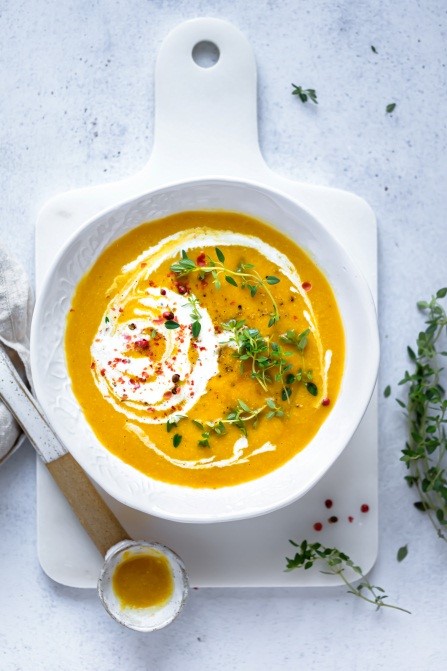

Finish the Wrap Up Test to obtain a certificate of completion!
Frances Sizer and Ellie Whitney, Nutrition: Concepts and Controversies, 15th Edition. Cengage, 2020.
Walter Willett, Eat, Drink, and Be Healthy: The Harvard Medical School Guide to Healthy Eating. Free Press, 2017.
Food Print, Real Food Encyclopedia
Harvard TH Chan School of Public Health, The Nutrition Source
Center for Science in the Public Interest: Eating Healthy
Brigid Titgemeier, "Regenerative healthcare: a solution for our broken food, farming, and healthcare systems?" The Chalkboard, July 29, 2020.
J. Bauer et al, "Evidence-based recommendations for optimal dietary protein intake in older people: a position paper from the PROT-AGE Study Group," Journal of the American Medical Association, 2013;14(8):542-559.
National Center for Health Statistics, CDC
Walter Willett, Eat, Drink, and Be Healthy: The Harvard Medical School Guide to Healthy Eating. Free Press, 2017.
Harvard TH Chan School of Public Health, The Nutrition Source
Harvard TH Chan School of Public Health, The Nutrition Source, "The Microbiome"
Frances Sizer and Ellie Whitney, Nutrition: Concepts & Controversies, 15th edition. Cengage, 2020.
Walter Willett, Eat, Drink, and Be Healthy: The Harvard Medical School Guide to Healthy Eating. Free Press, 2017.
Brigid Titgemeier, "Regenerative healthcare: a solution for our broken food, farming, and healthcare systems?" The Chalkboard, July 29, 2020.
Susan Cosier, "The world needs topsoil to grow 95% of its food—but it's rapidly disappearing," The Guardian, May 30, 2019.
Amy Westervelt, "Whitewashing organics," Atmos, October 4, 2021.
Damian Carrington, "$1M a minute: the farming subsidies destroying the world—report," The Guardian, September 16, 2019.
Raj Patel, "Agroecology is the solution to world hunger," Food Navigator, August 4, 2020.
Katy Askew, "Biodiversity loss and food production: An existential threat on the same level as the climate crisis," Food Navigator, August 4, 2020.
ATTRA: Sustainable Agriculture Program
Barilla Center for Food and Nutrition, "A One Health Approach to Food," April, 2021.
Science News, "Do you know the carbon footprint of your food choices?" December 17, 2018.
Gene Baur, "It's time to dismantle factory farms and get used to eating less meat," The Guardian, May 19, 2020.
Socially Responsible Agriculture Project
Matthew P. Sanderson, "Big Agriculture is leading to ecological collapse," Foreign Policy, May 17, 2021.
Michael Clark et al, "Multiple health and environmental impacts of food," Proceedings of the National Academy of Sciences, November 12, 2019.
Rockefeller Foundation, "Reset the Table: Meeting the Moment to Transform the US Food System," July 2020.
Natural Resources Defense Council, "Regenerative Agriculture Part 4: The Benefits," February 14, 2021.
Nishan Degnarian, "Ocean crops: is this the next frontier for agriculture?" Fortune, July 29, 2020.
Isabella Tree, "How to Return a Farm to the Wild—And Maybe Save the Planet," Time, October 3, 2019.
Daniel Imhoff, "Make the corn belt a carbon belt," The Progressive Magazine, December 10, 2020.
US Environmental Protection Agency, "Overview of Greenhouse Gases"
Action Against Hunger International Security Policy 2021
ReFED, "Roadmap to 2030: Reducing Food Waste," 2019
Todd Hardin, "Plastic: It's Not All the Same," February 23, 2021.
Maria Trimarchi et al, "Top 10 Eco-friendly Substitutes for Plastic," How Stuff Works, April 9, 2021.
Virginia Aronson, Mottainai: A Journey in Search of the Zero Waste Life. London: Dixi Books, 2019.
Eric Holt-Giménez, "Food Workers—Food Justice," Food First Backgrounder, Summer, 2010.
Helena Bottemiller Erich, "Could covid-19 finally end hunger in America?" Politico, September 9, 2021.
Catherine Bukowski and John Munsell, "The rise of community food forests," Sustainable America, August 29, 2018.

photo by Dorothea Oldani on Unsplash
Here are some good resources for further reading. Some are old but still worth exploring. There will continue to be new scientific discoveries, but the best nutrition advice we get or give remains the same: healthy food means healthy children, healthy animals, and a healthy planet.
Eat, Drink, and Be Healthy: The Harvard Medical School Guide to Healthy Eating by Walter Willett (The Free Press, 2017)
Food Politics: How the Food Industry Influences Nutrition and Health by Marion Nestle (University of California Press, 2013)
Unsavory Truth: How Food Companies Skew the Science of What We Eat by Marion Nestle (Basic Books, 2018)
We Are What We Eat by Alice Waters (Penguin, 2021)
The Omnivore's Dilemma by Michael Pollen (Penguin, 2007)
Foodopoly: The Battle Over the Future of Food and Farming in America by Wenonah Hauter (The New Press, 2012)
Farmacology: Total Health from the Ground Up by Daphne Miller (William Morrow, 2016)
The Third Plate: Field Notes on the Future of Food by Dan Barber (Penguin, 2015)
The Organic Life by Joan Gussow (Chelsea Green Publishing, 2001)
Miraculous Abundance: One Quarter Acre, Two French Farmers, and Enough Food to Feed the World by Perrine and Charles Hervé-Gruyer (Chelsea Green Publishing, 2016)
The One-Sided Straw Revolution: An Introduction to Natural Farming by Masanobu Fukuoka (New York Review of Books Classics, 2009)
Diet for a Small Planet, 20th Edition by Francis Moore Lappé (Ballantine, 1991)
Wilding by Isabella Tree (Picador, 2019)
Soil Not Oil by Vandana Shiva (North Atlantic Books, 2015)
American Wasteland: How America Throws Away Nearly Half of its Food (And What We Can Do About It) by Jonathan Bloom (DaCapo, 2010)
Waste: Uncovering the Global Food Scandal by Tristram Stuart (Norton, 2009)
Waste-Free Kitchen Handbook by Dana Gunders (Chronicle, 2015)
My Zero Waste Kitchen by Kate Turner (DK, 2017)
Fast Food Nation by Eric Schlosser (Mariner Books, 2012)
Check out these cookbooks if you want to bring fresh new foods, delicious healthy recipes, less waste and more and variety to your home menus.
Nutrition Stripped: 100 Whole Food Recipes Made Deliciously Simple by McKel Hill (William Morrow, 2016)
The Art of Simple Food by Alice Waters (Clarkson Potter, 2013)
Bounty from the Box: The CSA Farm Cookbook by Mi Ae Lipe (Twisted Carrot Publishing, 2015)
Sustainably Delicious by Michel Nischan (Rodale, 2010)
The Zero Waste Chef by Anne-Marie Bonneau (Avery, 2021)
Cook More, Waste Less by Christine Tizzard (Random House, 2021)
Good and Cheap: Eat Well on $4/Day by Leanne Brown (Workman Publishing, 2015)
The 30-Minute Mediterranean Diet Cookbook by Serena Ball and Deanna Segrave-Daly (Rockridge Press, 2018)
The Mediterranean Diet Cookbook for Beginners by Elena Paravantes (DK, 2020)
Half Baked Harvest Cookbook by Tieghan Gerard (Clarkson Potter, 2017)
There are lots of great plant-based cookbooks to choose from these days. Here are some good ones.
Vegan for Everybody by America's Test Kitchen (ATK, 2017)
Everyday Vegan by Good Housekeeping (Hearst, 2018)
Plant-Powered for Life by Sharon Palmer (The Experiment, 2014)
The Vegetarian Flavor Bible by Karen Page (Little, Brown, 2014)
These organizations are working hard to protect our food supply, natural resources, farm animals, food workers, and the planet. You may want to join them or support them—or both!
Feeding America (national program of food banks, food pantries, shelters, and community-based agencies for feeding the hungry)
World Central Kitchen (José Andrés' international crisis response team that delivers homemade meals after natural disasters)
Food Forward (volunteer program for gleaning unwanted produce and bringing fresh food to the food insecure)
ReFED (international program addressing food waste via data sharing and streamlining, funding, and coordinating global efforts)
Break Free From Plastic (global movement to mandate reduction in single-use plastic)
SRAP (the Socially Responsible Agriculture Program helps to protect communities impacted by CAFOs)
Rainforest Action Network (working to preserve the world's rainforests and stop child labor, specifically in the production of palm oil)
GreenWave (provides education and support to sustainable ocean farmers)
Food First (the Institute for Food and Development Policy prepares books and reports on hunger and food sovereignty)
Food and Water Watch (challenges corporations and policies that fail to support human rights and a sustainable future)
Coalition of Immokalee Workers (defends the rights of food workers by preventing workplace violence and human trafficking while creating partnerships between growers and food retailers that will uphold workers' rights)

photo by Monika Grabkowska on Unsplash
NOTE: This interactive website is an educational project of Food and Nutrition Resources Foundation, a Florida-based organization that supports good food nonprofits like those listed above.